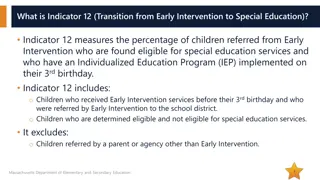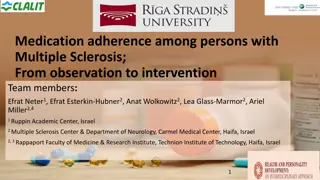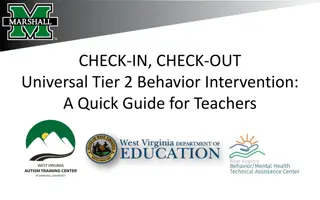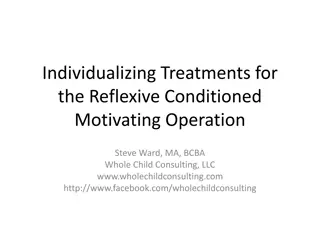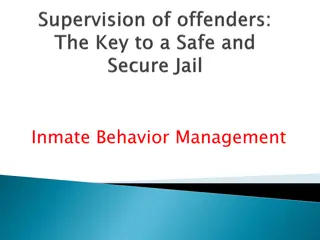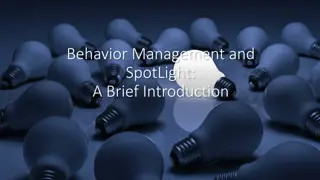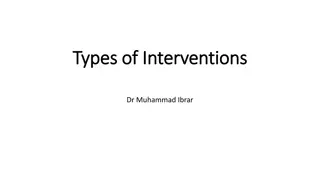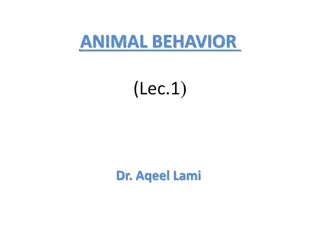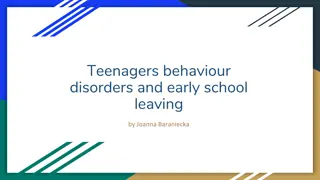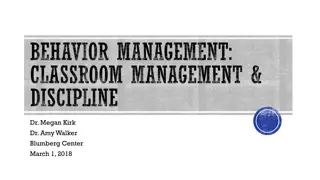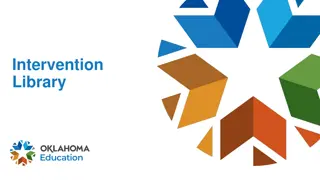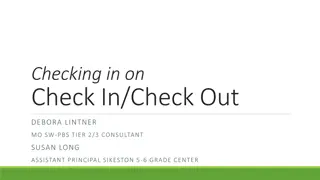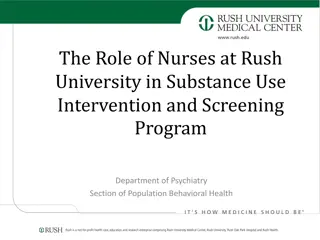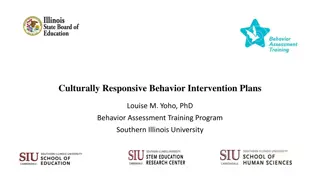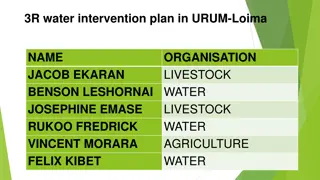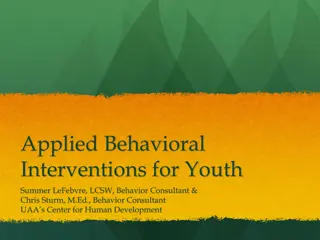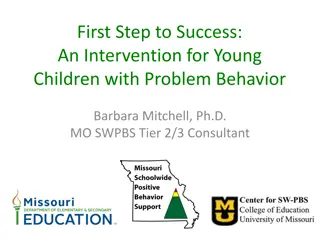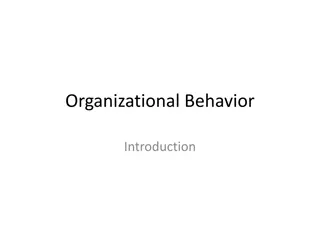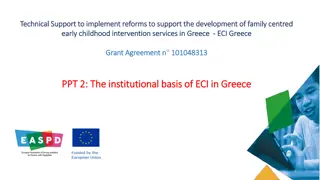Function Based Thinking
Function-based thinking in Missouri Schoolwide Positive Behavior Support, emphasizing data-based decision-making, mission clarity, and effective teaching practices. Understand how behavior is related to the environment and how environmental interventions play a key role in shaping expected behaviors
6 views • 27 slides
Mindfulness-Based Intervention for Adolescents with Chronic Migraine: Qualitative Study
This study focuses on developing a mindfulness-based intervention for adolescents with chronic migraine, aiming to address the lack of effective treatments. Through remote interviews and qualitative analysis, stakeholders' experiences and feedback are being gathered to adapt the intervention. The re
0 views • 15 slides
Social Network-Based Intervention Improves HIV Testing and Linkage Among Fishermen in Kenya
In sub-Saharan Africa, a study was conducted among Lake Victoria fishermen in Kenya to assess the effectiveness of a social network-based intervention in improving HIV testing and linkage outcomes. Results showed significantly higher rates of HIV self-testing and linkage to health facilities in the
0 views • 19 slides
Addressing Predatory Behavior in the Fellowship
Predatory behavior, especially towards vulnerable members, is a concerning issue in the fellowship. This behavior includes unwelcome advances, exploitation of power dynamics, and institutional sexism. The discussion on predatory behavior necessitates honest dialogue and a united approach for a safer
3 views • 13 slides
Behavior Progress Monitoring for Individualized Instructional Planning
Utilizing behavior progress monitoring allows educators to track student performance over time, make data-informed decisions to improve responsiveness to interventions, and tailor instructional plans for individual students. This comprehensive approach involves steps such as setting the stage, analy
6 views • 52 slides
Complex SFA CTO Intervention Live Case Study - 11/29/2023
A 72-year-old gentleman with severe RLE claudication referred for evaluation. Despite medical therapy, he experiences rest pain. Past medical history includes diabetes, hypertension, hyperlipidemia, hypothyroidism, and prior PAD intervention. The case details the patient's presentation, vital signs,
1 views • 5 slides
Understanding the Role of Board-Certified Behavior Analysts in Supporting Students with Autism in PA School Programs
Pennsylvania Training and Technical Assistance Network (PaTTAN) plays a crucial role in supporting students with autism through the efforts of Board-Certified Behavior Analysts. The increasing number of students eligible for IEPs under the definition of autism necessitates skilled educators who can
0 views • 20 slides
Understanding Indicator 12: Transition from Early Intervention to Special Education
Indicator 12 measures the successful transition of children from Early Intervention to Special Education by evaluating the percentage of children referred from Early Intervention who are found eligible for special education services and have an Individualized Education Program (IEP) in place by thei
1 views • 6 slides
Routines-Based Intervention for Early Childhood Home Visiting
Learn about the Routines-Based Intervention for Early Childhood Home Visiting by Robin McWilliam from the Evidence-based International Early Intervention Office. Explore how children learn, service decision-making, support provision, and evaluation. Understand the importance of needs assessment, eng
0 views • 34 slides
Enhancing Medication Adherence in Multiple Sclerosis Patients
This study explores medication adherence among individuals with Multiple Sclerosis (MS), presenting insights from observation to intervention stages. It delves into the background of MS, adherence, Disease-Modifying Therapies (DMTs), and the challenges faced. The team identifies reasons for non-adhe
0 views • 41 slides
Comprehensive Guide to Check-In, Check-Out Universal Tier 2 Behavior Intervention for Teachers
Explore the Check-In, Check-Out Universal Tier 2 Behavior Intervention designed to provide structure, accountability, and feedback to students, improving behavior and academic success. Discover how it creates a strong home-school connection and is tailored for students not meeting Tier 1 expectation
0 views • 18 slides
Understanding Consumer Behavior in Marketing
The design of a marketing program starts with understanding consumer behavior. Consumers, as the end users, play a crucial role in shaping market trends. Producers seek insights into consumer personas, market behaviors, and influencing factors. Management focuses on the consequences of consumer beha
2 views • 26 slides
Understanding Psychology: The Science of Behavior and Mental Processes
Psychology is the scientific study of behavior and mental processes. Psychologists study both observable behavior and private mental processes. The primary goals of psychology are to describe, understand, predict, and control behavior. Different branches of psychology, such as applied psychology, cl
2 views • 29 slides
Intervention Boosting Self-Efficacy Among Adolescents Challenging Discrimination
Adolescents challenging discrimination through a perspective-taking and action-planning intervention showed increased self-efficacy, particularly among White participants. The intervention, which included facilitated discussion sessions, led to positive outcomes and highlighted the importance of bys
0 views • 7 slides
Boosting Self-Efficacy in Adolescents: Intervention Study
Adolescents challenged discrimination through a perspective-taking and action-planning intervention, leading to increased self-efficacy, especially among White participants. The intervention involved facilitated discussions, self-disclosure, and sharing experiences to empower adolescents to interven
0 views • 7 slides
Effective Intervention Planning for Rehabilitation Services
The intervention in the DEA programme involves a thorough assessment of user needs, formulation of objectives, and planning based on case management technology. The cycle includes assessment, planning, and actual intervention. Prioritizing high-priority problems is essential for effective outcomes.
1 views • 13 slides
Individualizing Treatments for Reflexive Conditioned Motivating Operation
Understanding the importance of individualizing treatments for escape/avoidance behaviors in individuals with ASD. Factors such as behavior change speed, alternative repertoires, and aversive stimuli considerations are crucial for effective intervention. Generic interventions may not address behavio
1 views • 47 slides
Understanding Inmate Behavior Management in Correctional Settings
Inmate Behavior Management in correctional facilities involves supervising inmates, implementing corrective discipline, and fostering a fair and consistent environment. It emphasizes the importance of behavior management plans, identifying undesirable traits in supervision, and passing educational a
0 views • 19 slides
Understanding Behavior Management and SpotLight System in Schools
This overview introduces Behavior Management and SpotLight in educational settings, emphasizing the importance of a positive behavior intervention system like SpotLight for effective school-wide management. It discusses the features, benefits, users, and methods of utilizing SpotLight to address var
0 views • 13 slides
Different Types of Interventions to Address Addiction Challenges
Every individual's addiction story is unique, requiring different types of interventions tailored to their specific needs. This article explores four popular intervention approaches - simple intervention, classical intervention, family system intervention, and crisis intervention - each designed to
1 views • 7 slides
Understanding Human Behavior: Foundations and Factors
Human behavior is a multifaceted subject influenced by genetic makeup, culture, and individual values. It encompasses both overt actions and covert thoughts, a product of the individual and environmental factors. Psychologists study behavior from visible (overt) actions like playing football to inne
0 views • 20 slides
Understanding Normal and Abnormal Behavior: Perspectives and Definitions
Normal behavior varies from person to person and society, influenced by individual preferences and societal norms. Abnormal behavior is characterized by an inability to function effectively or personal discomfort. The concept of normality and abnormality in psychology raises complex questions about
2 views • 8 slides
Understanding Human Behavior: Insights for Social Workers
This material delves into the intricacies of human behavior, exploring factors influencing behavior such as heredity, environment, intelligence, needs, and motives. It covers the concept of human behavior, stages in life from conception to old age, and theories of human development by eminent psycho
2 views • 71 slides
Understanding Animal Behavior and Ecology
Animal behavior encompasses a range of activities such as feeding, breeding, and social interactions. Ethology focuses on studying behavior in natural environments, while behavioral ecology examines ecological aspects like predator-prey interactions. Sociobiology delves into the evolution of social
3 views • 5 slides
Understanding Teenagers' Behavior Disorders and Solutions by Joanna Baraniecka
The adolescent period presents various challenges for teenagers, leading to behavior problems like lying, aggression, impulsivity, and more. Major causes include family issues and emotional disorders, requiring professional intervention. Recognizing signs of behavioral problems is crucial for early
0 views • 29 slides
Understanding Behavior Management in Classroom Settings
Explore the essential topics of behavior management, classroom strategies, and discipline in educational settings. Delve into the functions of behavior, impact of trauma on learning, and effective management techniques. Learn how to identify underlying reasons for student behaviors, discuss behavior
0 views • 76 slides
Academic Intervention Library Overview
Explore the Intervention Library for academic and behavior interventions, accessed through OKMTSS. Filter interventions by grade band, intensity level, and group size. Understand grade band considerations and intervention intensity tiers. Learn about the recommended group sizes and how to choose the
0 views • 15 slides
Targeting Emotions to Facilitate Behavior Change in Older Adults
Efforts in changing health behavior have traditionally focused on social and cognitive factors, but recent evidence highlights the importance of affective states in decision-making and behavior change. Janey Peterson discusses the role of emotions in achieving and sustaining behavior change to benef
0 views • 11 slides
Grading Criteria for Effort and Behavior in Educational Reporting
Effort and behavior in educational settings are evaluated based on criteria ranging from Excellent to Causing Concern. Pupils demonstrating excellent behavior show respect, responsibility, and positive engagement in learning. Those with good behavior exhibit cooperation and respect for others, albei
0 views • 9 slides
Comprehensive Overview of Check-In/Check-Out Intervention for Behavioral Support in Schools
The content provides detailed information on the Check-In/Check-Out (CICO) intervention for behavioral support in schools. It covers the implementation levels, benefits, research support, intervention overview, reasons why CICO works, and the basic cycle involved in CICO. The CICO strategy aims to e
0 views • 33 slides
The Role of Nurses at Rush University in Substance Use Intervention and Screening Program
The nurses at Rush University play a crucial role in the Substance Use Intervention and Screening Program Department of Psychiatry, focusing on SBIRT (Screening, Brief Intervention, Referral to Treatment) to identify and intervene with those at risk for substance use issues. The program utilizes Mot
0 views • 13 slides
Culturally Responsive Behavior Intervention Plans Webinar Series
This webinar series explores the significance of culturally responsive evidence-based behavior intervention plans for students, especially those from historically marginalized groups. It addresses the impact of exclusionary discipline practices, provides insights on functional behavior assessment (F
0 views • 28 slides
Water Intervention Plan in Urum-Loima Region
This water intervention plan in the Urum-Loima region focuses on addressing water gaps and potential zones for groundwater exploration. It includes related interventions such as open water storage and sand dams to meet current and future water demands for domestic, livestock, and agricultural use. T
0 views • 9 slides
Understanding Applied Behavior Analysis (ABA) for Youth Interventions
Applied Behavior Analysis (ABA) is a science focusing on improving human behavior by increasing desired behaviors, teaching new skills, and generalizing behaviors. ABA emphasizes observable behaviors, measurement of behavior change, and the use of interventions in various settings like classrooms an
0 views • 25 slides
PBIS Expectations and Behavior Flowchart
The PBIS flowchart outlines behavior expectations and interventions for minor and major incidents in a school setting. It covers disrespectful behavior, disruption, defiance, property damage, theft, possession of weapons, and more. The flowchart guides teachers and staff on managing and addressing s
0 views • 6 slides
Managing Acting-Out Behavior: A Staff Development Program Review
This review discusses a staff development program created by Geoffrey Colvin, Ph.D., from the University of Oregon, focusing on preventing and managing acting-out behavior in students with emotional disturbance or behavior disorders. The program includes video presentations, strategies for behavior
0 views • 22 slides
Understanding Antisocial Behavior in Young Children
This intervention program by Barbara Mitchell, Ph.D., addresses the critical need for early intervention in children displaying antisocial behavior. It covers key components of the program, discusses examples of antisocial behavior, potential negative long-term outcomes, and emphasizes the importanc
0 views • 45 slides
Understanding Organizational Behavior and Individual Behavior
Organizational Behavior (OB) is a multidisciplinary field that combines knowledge from various disciplines to study and manage organizations effectively. It emphasizes the application of this knowledge to enhance organizational effectiveness and the well-being of participants. OB is a useful concept
0 views • 38 slides
Function-Based Behavior Support Plans: A Comprehensive Guide
Explore the process of developing Function-Based Behavior Support Plans (BSP) using Functional Behavioral Assessment (FBA). Understand the concepts of function and functional behavior assessment, learn how FBA/BSP fits within a multi-tiered support system, and practice developing BSP for students. D
0 views • 74 slides
Supporting Family-Centered Early Childhood Intervention Services in Greece
The grant agreement aims to implement reforms supporting the development of family-centered early childhood intervention services in Greece. It emphasizes the human rights and child rights framework, highlighting the legal and political basis of early childhood intervention in the country. The conte
0 views • 7 slides







